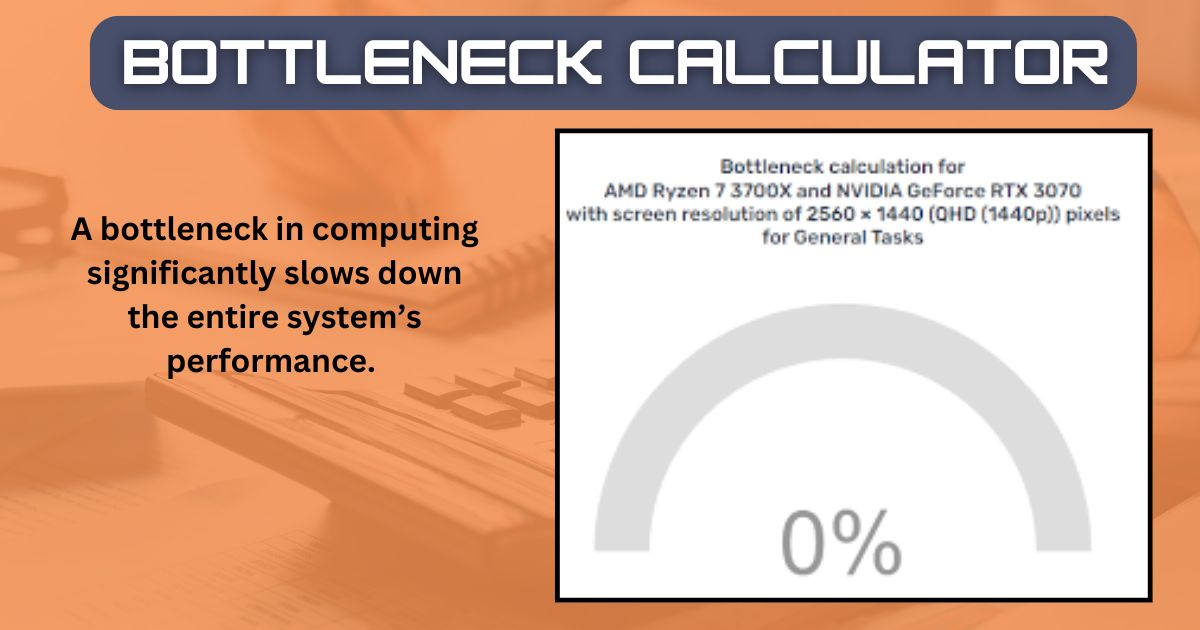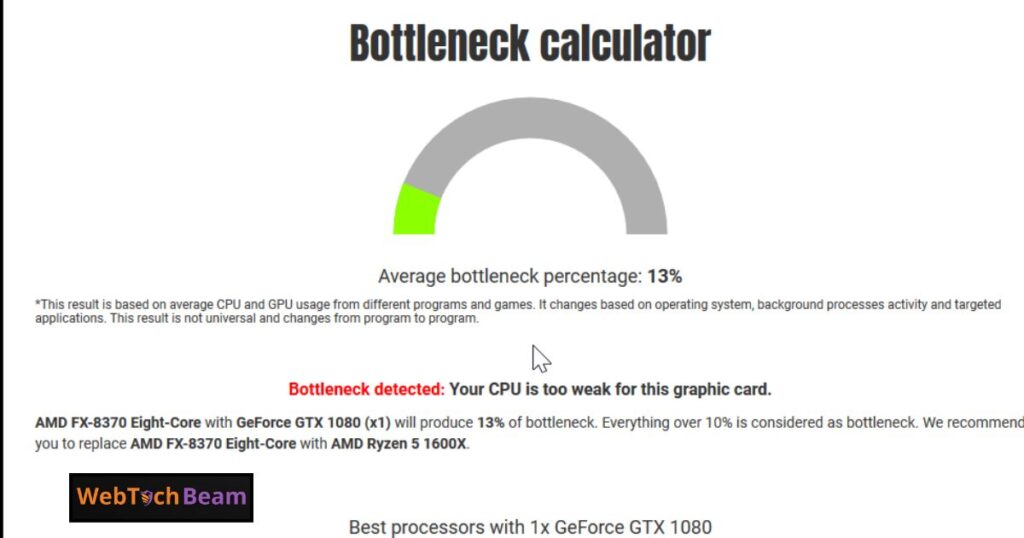What Is Bottleneck Calculator And Its Benefits: A Comprehensive Guide

Definition of a bottleneck in computing
A bottleneck in computing significantly slows down the entire system’s performance. This issue occurs when a specific component cannot keep up with the rest of the system. Resolving bottlenecks ensures smoother and faster computing experiences for users.
Purpose of a bottleneck calculator
A bottleneck calculator quickly identifies which computer component causes performance issues. Users can easily use this tool to make informed decisions on necessary upgrades. This calculator helps balance system resources for optimal performance.
Understanding Bottlenecks
Bottlenecks in computing refer to workings that limit complete system performance. They commonly occur in four main areas: CPU, GPU, RAM, and Storage.
Types of Bottlenecks
- CPU Bottleneck: The CPU can’t method data fast enough, reducing the whole system.
- GPU Bottleneck: Graphics Processing Unit edges performance during graphics-intensive tasks like gaming or video editing.
- RAM Bottleneck: Incomplete RAM reasons the system to slow down, mainly in multitasking situations.
- Storage Bottleneck: Slow storage devices will lead to longer load times and slow performance.
Common Causes of Bottlenecks
- Outdated Hardware: Older hardware workings can’t keep pace with fresher software demands.
- Imbalance: Having a high-end GPU with a low-end CPU can make performance matter.
- Insufficient Cooling: Overheating can control the performance of components, affecting bottlenecks.
- Software Issues: Unwell-optimized software can put needless strain on positive hardware components.
Impact on System Performance
- Reduced Efficiency: Bottlenecks make your system less open and effective during high workloads.
- Longer Load Times: Programs and games take longer to start and work.
- Lag and Stuttering: Users experience noticeable lag and stuttering, especially in graphics-heavy applications.
- Wasted Upgrades: Upgrading one component without addressing bottlenecks won’t improve overall performance.
What Is a Bottleneck Calculator?

Explanation of a bottleneck calculator
A bottleneck calculator helps identify which component limits your computer’s performance. It’s a useful tool for gamers and PC builders. By using simple inputs, it calculates the balance between your CPU and GPU. This ensures you get the most out of your hardware. It’s especially helpful when planning upgrades to avoid unnecessary expenses.
Many websites offer free, easy-to-use bottleneck calculators. Just enter your system specs, and the calculator will show potential bottlenecks. This lets you make informed decisions and enjoy a smoother computing experience.
How it works: Analyzing hardware components
First, the calculator asks for your CPU and GPU specifications. It compares the performance of both components. Then, it calculates any imbalance that might limit your system’s speed. The tool considers the tasks you commonly perform, providing a clear picture of potential performance issues.
Finally, the bottleneck calculator suggests upgrades that could improve your computer’s efficiency. This ensures you spend wisely and avoid unnecessary hardware expenses. Using the tool is simple and quick, making it user-friendly.
Importance of accurate measurements
Accurate measurements ensure that you focus on fixing the right component. They also save you from unnecessary upgrades that don’t solve the problem. This accuracy helps achieve a smoother, faster computing experience.
How to Use a Bottleneck Calculator
Step-by-step guide for users
- Open your preferred bottleneck calculator website.
- Choose your computer’s hardware specifications manually.
- Input the details of your CPU, GPU, RAM, and Storage.
- Click the “Calculate” button for instant results.
Selecting and inputting hardware specifications
- Select your CPU model from the dropdown list menu.
- Choose your GPU with the exact make and model.
- Enter your RAM size and speed rating details.
- Provide information about your storage type and speed.
Interpreting results and diagnostics
- Review the results to see highlighted problem components.
- Identify which component experiences the highest bottleneck percentage.
- The results guide you on necessary upgrades.
- Use the advice to balance your system for better performance.
Also Read: What is Pikruos? Best Detail Guide
Benefits of Using a Bottleneck Calculator

Note on the Benefits of Using a Bottleneck Calculator
- Optimizing system performance: A bottleneck calculator helps improve how your computer runs overall.
- Identifying necessary upgrades: It tells you exactly what parts need upgrading.
- Cost-effectiveness: Avoiding unnecessary purchases: Prevent wasting money on parts that won’t help performance improve.
Real-life Applications

Case Studies of Successful Optimizations
- John used a bottleneck calculator and found his CPU slowing down his gaming rig.
- After discovering the issue, he upgraded his CPU and enjoyed smoother gameplay experiences.
- Emily’s video editing software lagged due to her outdated GPU, which was identified using a bottleneck calculator.
- By upgrading her GPU, Emily experienced faster rendering and improved software performance significantly.
- Mike’s multitasking was poor because of low RAM, which a bottleneck calculator diagnosis revealed.
- Adding more RAM allowed Mike to run multiple programs smoothly without any slowdowns.
Common Scenarios Where Bottleneck Calculators Are Beneficial
- Gamers use bottleneck calculators to ensure top performance for the latest game releases.
- Content creators use these tools to optimize their machines for video and graphic design tasks.
- Regular computer users benefit from bottleneck calculators to enhance everyday tasks like browsing and streaming.
- Upgraders can avoid mismatched components by analyzing their current hardware setup before purchasing.
- Office environments see productivity boosts when system bottlenecks are identified and resolved promptly.
- Students can ensure their laptops perform well for research, coding, and multimedia projects.
Popular Bottleneck Calculators
Overview of Well-known Bottleneck Calculators Available Online
- PC-Build’s Bottleneck Calculator: User-friendly and provides comprehensive hardware assessments quickly and easily.
- CPU Agent: Known for accurately analyzing the CPU and GPU performance relationships.
- Bottleneck Calculator by My PC Build: Offers detailed insights into your system’s bottleneck issues.
Comparison of Features and Usability
- PC-Build’s Bottleneck Calculator: Simple interface makes it easy for beginners to use without confusion.
- CPU Agent: Advanced metrics for enthusiasts wanting more in-depth performance analysis and component recommendations.
- Bottleneck Calculator by My PC Build: Balances ease of use with detailed analysis for many users.
Tips and Best Practices

Ensuring Accurate Inputs
- Always double-check your hardware specifications before entering them into the calculator.
- Use manufacturer websites to verify the details of your computer components.
- Ensure you select the correct make and model to get precise results.
- Enter your component data carefully to avoid mistakes and inaccurate outputs.
Integrating Results with Other System Diagnostics
- Combine bottleneck results with system health checks for comprehensive diagnostics.
- Use the bottleneck data alongside benchmarks and stress tests for better insights.
- Consult your results with a trusted computer technician for further evaluation.
- Pair your diagnostics tools for a holistic view of your computer’s performance.
Regular Checks and Updates
- Run the bottleneck calculator periodically after system changes to maintain performance.
- Update your hardware details in the calculator when you upgrade components.
- Re-evaluate your system after installing new software to check for performance changes.
- Periodically assessing bottlenecks helps keep your system running smoothly.
Conclusion
A bottleneck calculator points out the weak hardware components in your system. These tools help improve your computer’s running performance by identifying upgrade needs. They save you money by preventing unnecessary hardware purchases that don’t boost performance. Gamers, content creators, and everyday users find bottleneck calculators handy. Regular checks with a bottleneck calculator keep your system in top shape.
Encouragement to Leverage Bottleneck Calculators for Optimal Computing Performance
- Use a bottleneck calculator to ensure smooth and efficient computer usage.
- Regularly check your system with a bottleneck calculator for the best results.
- Save money and time by using these simple yet effective diagnostic tools.
- Improve your complete experience by addressing hardware bottlenecks as they rise.
FAQs
What is a bottleneck calculator?
A bottleneck calculator considers which hardware component limits your computer’s performance. It requires your CPU and GPU specs for analysis. This helps identify any imbalance affecting your system’s speed. The tool ensures you understand potential performance issues clearly. Using a bottleneck calculator can optimize your computer’s efficiency easily. It also helps plan hardware upgrades wisely.
How do you calculate bottlenecks?
To calculate bottlenecks, enter your CPU and GPU conditions into the calculator. The tool compares their performance to find imbalances. It then suggests potential bottlenecks in your system. This helps you understand which component may slow your computer down. The process is quick, simple, and real. It aids in planning hardware upgrades efficiently.
What is a bottleneck in computing?
A bottleneck in computing occurs when one component limits the complete system performance. This often happens with the CPU or GPU. Identifying the bottleneck helps improve your computer’s efficiency. It confirms that all components work harmoniously to enhance speed. Understanding bottlenecks is vital for optimizing performance. Resolving them can lead to smoother operation.
Which bottleneck is good?
No bottleneck is considered good for a computer’s performance. Balanced components work best for optimal operation. Identifying and addressing bottlenecks improves overall efficiency. It ensures smooth and fast computing experiences. Regularly checking for bottlenecks can maintain your system’s performance at its best.
What is a bottleneck in computing?
A bottleneck in computing refers to a component within a computer system that meaningfully slows down complete performance. This occurs when the volume or speed of one component limits the potential performance of other workings, leading to suboptimal operation.
How does a bottleneck calculator work?
A bottleneck calculator analyzes the situations of your computer’s hardware components. Comparing the performance capabilities of the CPU, GPU, RAM, and other parts classifies which component is causing the delay or lag in performance.
Why should I use a bottleneck calculator?
A bottleneck calculator helps improve your computer’s performance by analyzing the hardware components that need an upgrade. This confirms that you can make cost-effective improvements without spending money on unnecessary parts.
Is a bottleneck calculator trustworthy?
Yes, a bottleneck calculator is generally trustworthy for performance insights. It offers valuable recommendations.
How do you calculate bottlenecks?
Calculate bottlenecks by separately analyzing CPU, GPU, RAM, and storage performance. Compare their efficiency together.
What does a bottleneck do?
A bottleneck slows down your computer’s complete performance. It limits speed and efficiency.





